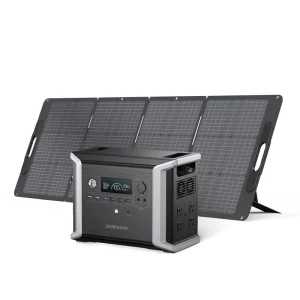Understand the physical size of portable generator you wish to buy, in order that it handle your power requirements and add up wattage of devices which are likely to get powered. Portable generators are usually quantified in watts (W) or kilowatts (kW), which specify how much electricity they are able to produce. For example, you could be just fine with a tiny 2000-watt portable generator if all it would do were charging gadgets, powering your mini microwave or running several lights and favorite scepters and such; whereas given no option of central power delivery for a brief while longer, the same household appliances like fridges, sump pumps etc. could be made to run due to an inoperative-installed solar-battery system and converted natural gas ovens by a heftier 5000-watt gentry.
A 1000-2000 watt generator may be sufficient for camping trips or tailgating, where power needs are minimal. It is just the size that can charge phones, run a few LED lights, even operate a small portable fridge. Camping generators are usually lightweight, with a lot of models weighing less than 50 pounds, which means that they are easy to move. Furthermore, they are inexpensive costing an average of $300-$500 for the higher quality brands depending on additional features.
To provide emergency home backup, you will need a larger portable generator. A 5000-watt generator is capable of running a small to medium-size home and allows you to run several essential appliances simultaneously. For instance, you could be required to acquire a fridge (600-800 watts), a sump pump (1000 watts) and then a furnace (500-1500 watts} center out of your external power supply supply. If that sounds about right, this would be good for a 5000-watt generator. You could also power a well pump (4000 watts at startup) or air conditioning units with that much electricity, but you may be pushing the limits and need more like 7000-9000.

There is also efficiency to consider when you are determining the size of your portable generator. Small systems may be more fuel-efficient per device, but models this size have not been tested with a single second device. As an example, the power-hungriest 5000-watt generator will eat about 0.75 gallons of gasoline per hour, and a more conservative 2000-watt model will only burn through somewhere like.4 gallons under average usage. Power output has to be balanced with fuel costs and availability, for those worried about it.
Generator Size has a linear correlation with Price. Ultra small, under-powered models are usually found in the $300 to $700 range. For house back up medium generators (5000-7000 watts), you might have to spend $700 — $1,500. Bigger units for whole-house systems or construction equipment can run up to $2,000. Example, do one find the money for it and two does that have enough power to handle what you need?
Previously, Elon Musk said "sustainable energy is the future but energy independence is also needed right now". That feeling is especially true when it comes to buying a portable generator because it allows homeowners to keep critical systems up and running during outages or power their outdoor adventures without the need of an external electrical outlet.
The run time of a portable generator is another essential.concurrent programming in scala One USP of what many models have to offer is that they can run up to 8-12 hours on a single tankful of gas while keeping a load at 50%. We believe, this is important for longevity if you are intending to use a generator over long periods, for example during a power outage lasting multiple days. Modern and efficient inverter generator may provide power-efficiently up to 18 hours even on a full tank that makes it completely reliable to use day as well night.
In the end, finding how big of a portable generator is right for you takes an honest evaluation of your power requirements, fuel efficiency goals or budget. Portable Generators from Dabbson are the perfect range of models, delivering robust solutions with superior performance that suits all uses, including camping or for useful back-ups in your home.
